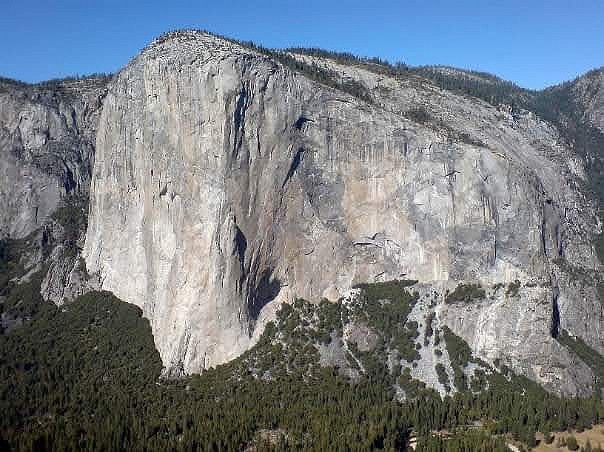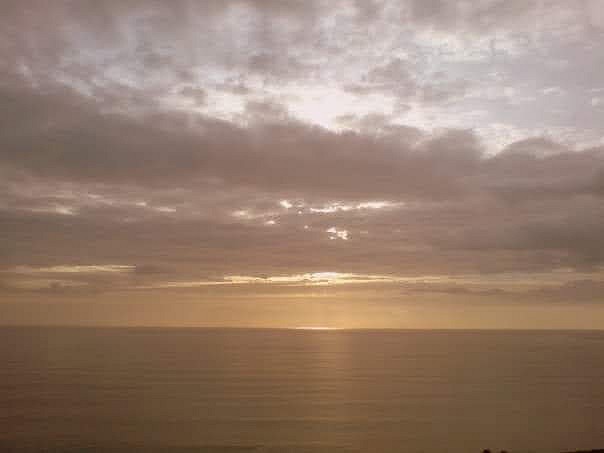
Toby Dunn examines the possibility of a post-pandemic world where travelling abroad is a different prospect. He argues that climbing and travel are intrinsically linked, but that local experiences can be just as enriching.
I can feel the long grass brushing my face, the lumpy tussocks are blissfully soft to lie on. A fragile warmth from the fading late afternoon sunshine warms the outside of my eyelids. It's not long now until the stretching shadows will swallow the Valley. I can't hear the trickle of the late summer Merced river behind me over the rich drawl of music through my headphones.
"I'm thinking sometimes things are moving too fast / 'cause from the very room I'm rhyming It be looking like the past / I know you didn't ask but f*** it / You're stuck with it you got to try…" - Bran Van 3000, Afrodiziak
This is one of my favourite memories of being thousands of miles from home and lost in the pure joy of being somewhere else. There is a particular state of happiness, often associated with intoxication of one sort or another, which is the only time that pop music lyrics actually make sense. In these pandemic-ridden times, it often seems that this sort of freedom isn't going to be available any longer.

I love travelling to climb, as do many, perhaps most climbers. It seems absolutely intrinsic to the activity. Travel is embedded within climbing culture, as it is in surfing, to a far greater extent than most other physical activities. Both also possess the shared cultural idiom of the local patch; whether this is the love of your local bouldering spot out of all proportion to any objective notion of quality or a jealous guarding of information on conditions or access to a 'secret' nearby break.
How might we experience the joy of discovery and novelty that we get from travel in a world which has, and is still changing to make travel less justifiable, more difficult and more expensive? Whether the concern is a risk of being quarantined on your return, or an assessment that aeroplane travel is not the frivolous travel option that it once seemed to be, but one with a profound environmental cost. In a post-pandemic world, it is also becoming rapidly more expensive, less pleasant and less plentiful.
I'd love to say that I have a great solution to this contradiction. But, as many people are I suspect, I'm struggling with the contradictions of really wanting to get away somewhere, while at the same time thinking that it is beginning to seem increasingly selfish, perhaps foolish to fly abroad several times a year. If you're tempted to brush this off with a flippant comment and carry on with your habits; then consider for a moment what it would take for you to stop travelling so regularly and casually: would it actually have to be because it's illegal or impossible?
Is it possible to experience the same thrill and internal peace that comes from being at some foreign cliff without leaving the UK? I have climbed obsessively since the late '90s and travelled around the UK and the wider world a lot in that time. I have lived in the South West, Sheffield, Leeds and Liverpool in that time and yet I could really easily come up with ten places which many people rave about within the UK that I've never been to. I've never been to Scafell, Dove Crag or bouldered at St Bees in the Lakes. I've never clipped a bolt at Shipwreck Cove, or on the Diamond. I've never been to Skye, Glencoe or Ben Nevis. I've never wobbled above the waves at Gurnard's Head or Lulworth Cove.
Just as easily I could come up with loads of crags I have been to - some many times - that seem to get ignored by many in preference for a more familiar option. Cornish granite is really unfairly ignored by many in preference of Pembroke. The sport climbing in South Devon has more pleasant weather and temperatures than much of the rest of the country (especially in the winter) and while I am well aware that it isn't Catalunya, it does have dozens of exceptionally memorable and excellent quality sport routes.
Given that the UK is a relatively small, densely populated island in the North Atlantic, it has an incredible variety and depth of climbable and interesting rock types. We lack an international honeypot destination such as Fontainebleau, Yosemite or Céüse but in a small area such as North Wales, you can access incredibly good trad climbing in the mountains or on sea cliffs, sport climbing and bouldering all within half an hour's drive of each other.

Often, the most satisfying climbing experiences are the ones that are enriched by history, or by a motivation borne from friends' stories or local knowledge about the route or problem. I'm aware that I'm in danger of sounding like I'm desperately trying to extol the thin virtues of a dull, damp windy island. As I write this, the screaming 60mph gusts of storm Francis are rattling the windows, you can see sheets of rain bowed out across the landscape in great, soggy arcs; it's late August. You might find some dry rock today in a greasy polished limestone cave, but in comparison with a dry climbing wall which has holds which are far less likely to fall off while you're trying a problem, it's probably going to lose. My mind strays back to memories of the spring and Greek tufa climbing on immaculate golden rock, day after day of perfect, cool, dry weather and more motivation to get out there and climb than my muscles and skin could cope with.
It is a struggle to reconcile the desire to roam abroad at every possible opportunity with the consideration of the responsibility of leading such an existence while the considerable impact of climate change and a global pandemic fill the news every day. There is a temptation to think that the actions of an individual will not make a significant difference; why not, as there will be others who act selfishly, so why deprive yourself? By this logic, however, you might as well pack in the job and learn how to manufacture and sell crystal meth and just steal everything that you need.
Perhaps the best answer is to travel more consciously, rather than just picking somewhere drier and sunnier than the UK with a collection of fairly nondescript routes that will fill the days and work up a good appetite for some paella. Identify something that truly inspires you and go less frequently, but with a more pure and strong motivation for a particular goal. When I think of my most memorable climbing travel experiences, they are things which were driven by a desire to climb them months or years before I got on a flight. Astroman or Freerider in Yosemite, El Matador on Devil's Tower, Lord of the Thais in Railay, La Marie Rose and Le Joker in Fontainebleau, or The Naked Edge in Eldorado Canyon. Are these always more treasured than memories of days on the Main Cliff at Gogarth, Dow Crag in the Lakes or Huntsman's Leap in Pembroke?
Some of my favourite days out in the UK might be a boiling hot, late July day at Cloggy when we did Shrike, The Axe, Great Wall and Jelly Roll, then went for a swim in the Tarn in the evening, and trotted down the hill to spend the rest of the evening in the pubs in Llanberis. No less atmospheric, though certainly less far to walk, Gordale is one of my favourite crags. Doing almost any route there, followed by a sunny evening lying on the grass outside the Lister Arms in the village with a restorative pint of Timothy Taylor is a beautiful experience.
Pentire Head is an immaculate, soulful, brooding crag; like many in the UK it has a stature which considerably exceeds its physical size. There cannot be many sea cliff days out which are superior to doing Darkinbad the Brightdayler and Black Magic. An equally superlative seacliff experience could be had at Bosigran, doing, for example, Little Brown Jug and Commando Ridge. Bosigran still has the mystic, Celtic air that permeates the North Coast of Devon and Cornwall but is a sunnier, less gothic day out than Pentire.
The Snowdon Horseshoe is the antithesis of getting away from the crowds, but a great play park level mountaineering experience. It changes wonderfully through the seasons from a potential casual fell run wearing shorts and a t-shirt in the summer, to a more serious day out, covered in ice and snow in the winter.
I love any day soloing on Stanage. When I first started climbing, years before I moved to Sheffield, I bought a copy of the now long-defunct On The Edge with an article by Niall Grimes about his favourite routes at Stanage. I still remember his choices and love the rough familiarity of the worn, rounded stone; the jugs of Flying Buttress Direct like brown sugar handfuls; the sweeping face of Queersville like a blown sail and Heaven Crack, the perfect comforting layback.
Aviation at Haytor was an aspiration when I started climbing. The fantastic traverse on giant warty crystals high on the grey granite shield involved terrifying rightward-inching from my cluster of protection the first time I did it. Years later it was a great way to finish a quick few evening solos on a hot summer day, glorying in the way that the sinking sunlight changed the colour of the stone as the evening wore on.
Porth Ysgo is to my mind one of the most beautiful places to boulder in the world. I love the way that the black gabbro boulders are interspersed with the rusting remains of shipping; bits of netting and ropes with fading nylon tendrils amongst the stones.
Whilst I think it is extremely important for anyone to look at the impact that their leisure time activity has on the world, I don't think that this need be limiting, whatever the restrictions on your time, finances or movement. The travel experiences available near at hand may be more enriching than what you might find by jumping on a plane out of habit. It may be more likely to rain, but I think, on balance, looking at rain in the UK is somehow less frustrating than it is if you've flown to Spain to get wet.


















Comments
Not that keen on this article...
"Perhaps the best answer is to travel more consciously, rather than just picking somewhere drier and sunnier than the UK with a collection of fairly nondescript routes that will fill the days and work up a good appetite for some paella."
That's obviously having a little pop at Spanish climbing holidays many Brit climbers enjoy. Going on to list 'inspiring' destinations in the US and Thailand that involve a hell of a lot more flying is a bit rich. Quick check on a carbon calculator and you could get 5 trips to Spain for 1 to the US West Coast/Thailand.
Did you read the entire article, because if so I'm rather confused by the conclusion you've made, because - at least to me - this was a very loving piece about what we've got under our nose, here in the UK.
I'm in a similar position to Toby, insofar as I've climbed all around the world, yet time and time again I'm reminded by just how lucky we are to live within an island with such a diverse array of rock types and climbing styles. I certainly don't see him advocating travelling the globe, because what he's ultimately saying is that there is no need to - we've got everything right here on our doorstep.
I think Toby's point is that those relatively cheap and easy European trips can generally be more easily exchanged for something fun in the UK.
He knows it’s harder to choose the UK over Yosemite, but when trips there are fewer and farther between and more expensive anyway, it’s the more frequent, short-haul trips where many of us can make the most difference.
That’s fine - but one paragraph does say that Toby thinks it’s okay to fly, repeatedly, to the US and Thailand, as long as you want to climb a famous route, and you do it slightly less frequently. Whichever way you spin it, that’s just nonsense.
If you’re going to write an article about appreciating what we have at home, I’d leave out the tick list of international routes. I can see why some readers might find it a bit galling.
Great article.